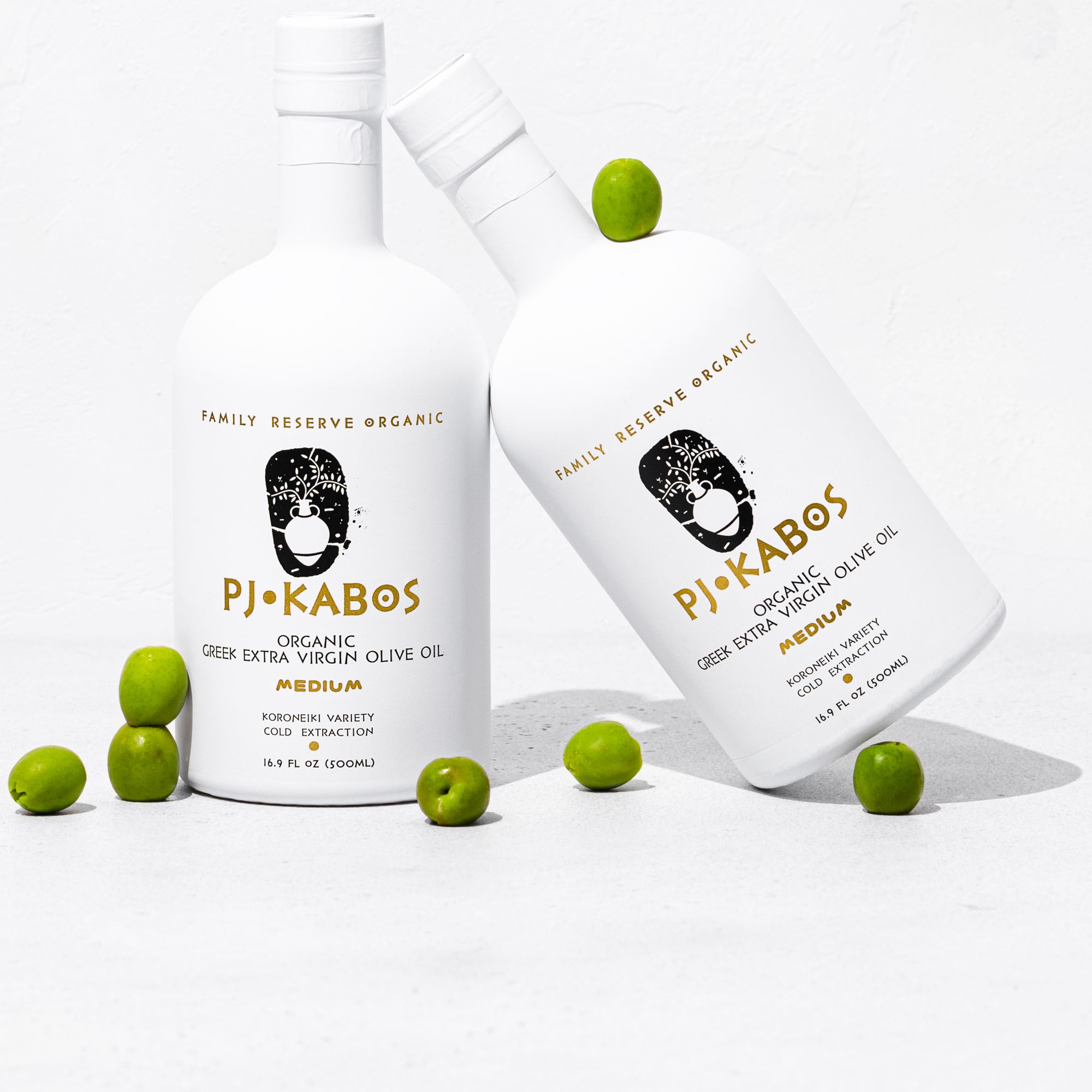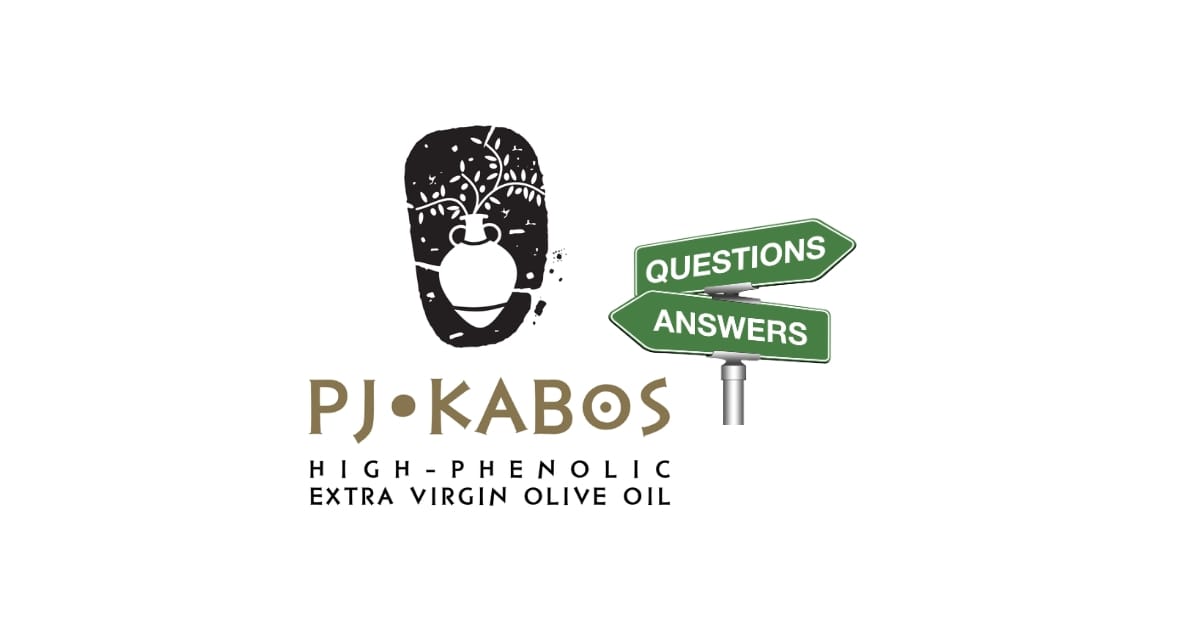It’s no secret that olive oil (especially extra virgin olive oil) is one of the healthiest cooking oils you can use. It’s been associated with a ridiculous number of health benefits such as reducing risk of heart disease and inflammation, lowering cholesterol, supporting bone and gut health, curbing risk of diabetes, and boosting the appearance of hair and skin.
But why is it so healthy? What is it within olive oil that sets it apart from the rest? Many of olive oil’s benefits can be chalked up to its high percentage of monounsaturated fatty acids (MUFAs) and its potent polyphenol compounds.
Monounsaturated fats, including oleic acid (the predominant MUFA found in olive oil), are a subtype of unsaturated fats found in healthy fatty foods like nuts, seeds, avocados, olives, and olive oil. Compared to many other types of fats, MUFAs are highly anti-inflammatory, which is what makes them so good for you.
Polyphenols are bioactive compounds, or natural chemical molecules, found in small quantities in certain plant-based foods that have potent antioxidant and anti-inflammatory properties, and have even been shown to fight off certain types of harmful bacteria and microbes in the body.
Together, olive oil’s MUFAs and various polyphenols contribute to a range of antioxidant, anti-inflammatory, and antimicrobial properties that are responsible for olive oil’s major perks.
Antioxidant properties of olive oil
Antioxidants are a class of compounds—some of which are created by the body itself and some of which we consume via plant-based foods, especially colorful fruits and veggies—that help protect your cells and tissues from damage caused by molecules known as free radicals.
When free radicals accumulate to unhealthy levels—whether it’s due to a poor diet, excessive sun exposure, pollution, exposure to toxins, stress, or a combination—they contribute to oxidative stress in the body. Oxidative stress is an imbalance between free radicals and antioxidants, and it contributes to many chronic health conditions, including diabetes, heart disease, and cancer.
So, needless to say: You want to minimize your exposure to things that boost free radical production, and increase your intake of nutrient-dense foods to be in healthy balance. Olive oil contains a range of antioxidant compounds known as polyphenols—but these polyphenols do a lot more than just combat oxidative stress, which you’ll learn below.
How are polyphenols and antioxidants related?
The term antioxidant is applied to a group of compounds that have demonstrated an ability to combat oxidative stress—and this group includes polyphenols. But that doesn’t mean the only benefit of polyphenols is their ability to combat oxidative stress. They have anti-inflammatory and antimicrobial perks, too. In fact, experts believe that polyphenols and other bioactive plant compounds likely play a variety of beneficial roles in the body that we don’t yet know about!
Extra virgin olive oil has the greatest levels of polyphenol compounds compared to other types of olive oil due to its minimal processing—and so, it has significant antioxidant properties. EVOO’s most well known polyphenols include hydroxytyrosol, oleuropein, and oleocanthal. Below, we’ll talk a bit about their antioxidant effects and other beneficial properties.
- Hydroxytyrosol: Hydroxytyrosol’s proven antioxidant activity may be one reason olive oil has been linked to reduced risk of cancer and improvements in blood lipids like cholesterol. For example, hydroxytyrosol and oleuropein seem to help prevent LDL cholesterol (low-density lipoprotein) from oxidizing into an even more harmful form of cholesterol. Some research suggests that olive oil polyphenols exert this effect by restoring levels of glutathione, which is considered the body's "master antioxidant." Hydroxytyrosol also has anti-inflammatory, anti-microbial (including anti-bacterial), and anti-thrombotic properties.
- Oleuropein: Oleuropein is actually the precursor to hydroxytyrosol. Much of it ends up getting converted into hydroxytyrosol, but some oleuropein remains when you consume olive oil. Oleuropein has been shown to protect the hypothalamus (part of the brain involved in maintaining bodily homeostasis, or balance) from oxidative stress and help reduce blood pressure. In addition to its antioxidant and anti-hypertensive effects, it also possesses cardioprotective, anti-inflammatory, and anti-cancer properties.Oleocanthal: Oleocanthal is the polyphenol responsible for giving extra virgin olive oil its classic peppery bite. Oleocanthal has proven antioxidant activity, and one recent study demonstrated its ability to protect neurons from oxidative damage caused by free radicals, suggesting it could play an important role in overall nervous system and mental health. It has potent anti-inflammatory effects, too, and has been shown to function similarly to ibuprofen. Oleocanthal also has anti-cancer and anti-microbial effects.
Anti-inflammatory properties of olive oil
Acute inflammation is necessary for healing injuries, cuts, and scrapes—since it increases blood flow to an area and brings necessary nutrients and immune cells along with it. Chronic inflammation, on the other hand, is bad news. It refers to a prolonged inflammatory response characterized by the simultaneous destruction and repair of tissues, and it’s at the root of nearly every chronic disease immangeable.
The good news: The monounsaturated fats and polyphenols in EVOO have anti-inflammatory properties that—along with an overall healthy diet—can help curb chronic inflammation.
MUFA-rich diets have been shown to reduce levels of C-reactive protein—a marker of chronic inflammation that’s often highly elevated in people with rheumatoid arthritis and other inflammatory diseases. Additionally, the polyphenol oleocanthal is highly anti-inflammatory and has pain-fighting properties, too. In fact, it has a similar mode of action as ibuprofen—which is that it inhibits the production of pro-inflammatory COX1 and COX2 enzymes. Researchers estimate that around 3.5 tablespoons of EVOO is the equivalent of a 200-mg tablet of ibuprofen.
Antibacterial properties of olive oil
The polyphenols in olive oil have antibacterial properties, too. But they don’t simply wipe out bacteria like an antibiotic—olive oil seems to decrease the growth of harmful bacteria, while promoting the growth of beneficial probiotic bacteria in the gut.
For example, research has found that olive oil contains antimicrobial polyphenol compounds that can help combat H. pylori infections, which are caused by a harmful bacteria and can lead to the development of stomach ulcers and even cancer. The findings of one study suggests that a daily 30-gram serving of EVOO may eliminate H. pylori infections in up to 40% of people in just two weeks. And another study found that certain various polyphenols present in extra virgin olive oil demonstrated strong bactericidal (i.e. antibacterial) activity against 8 strains of H. pylori, three of which are normally resistant to some antibiotics.
Interestingly, though, other research has found that daily consumption of about 1.5 tablespoons of extra virgin olive oil increased populations of bifidobacteria (a type of healthy gut bacteria) as well microbial metabolites responsible for antioxidant activity.
Taking Full-Advantage of Olive Oil’s Many Benefits
Clearly, extra virgin olive oil has some powerful therapeutic benefits, thanks to its beneficial fatty acids and polyphenols compounds, which contribute antioxidant, anti-inflammatory, and antimicrobial perks.
But how should you take advantage of it? First and foremost, opt for a high-quality EVOO with a peppery bite (a pungent flavor is indicative of higher polyphenol levels), and store it in a cool, dark place such as a cabinet that’s far away from any heat sources.
As far as how much olive oil you consume per day—that will depend on your specific health goals, but anywhere from 1-3 tablespoons is probably fine (in Mediterranean countries, some people consume a lot more!).
Just remember, polyphenols are prone to degradation when heated. So if you want to maximize your polyphenol intake, be sure to use EVOO in plenty of raw applications such as in salad dressings or dipping oils, or use it as a finishing oil on warm grain dishes, fish, and meats.
Product placement
PJ KABOS 'Family Reserve Organic - Medium'
High Phenolic and 2022 Gold-Award Winner.
Declared as 'One of the World's Best Olive Oils'.
Click here to shop.





